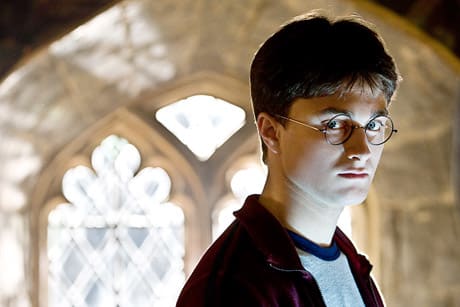Delayed from its initial late 2008 release, much to the chagrin of Potter fans everywhere desperate to see what is arguably the strongest book in the series adapted to film, The Half-Blood Prince doesn't disappoint. Rather, it surprises with a deliberate, contemplative deftness previously unseen in the series, proving to be the strongest, most engrossing entry by far. Purists may take offence to the minor climactic alterations and a stripped-down, greyed and gothic "real world" sensibility but few can dispute the thrill and impact of the ride.
Starting with a bit of necessary exposition to introduce Hogwart Academy's newest Potions professor, Horace Slughorn (Jim Broadbent), Harry Potter and the Half-Blood Prince dives into Harry's (Daniel Radcliffe) suspicions of Draco Malfoy's (Tom Felton) true intentions, which seem to involve a shady agreement between Narcissa Malfoy (Helen McCrory) and Professor Snape (Alan Rickman), and a necessary, dreadful action. All we know is that it relates to the evil Voldemort and a secret that Slughorn is withholding from Dumbledore (Michael Gambon).
Meanwhile, Ron Weasley (Rupert Grint) finds success as a Quidditch goalie, sparking the affections of a particularly enamoured Lavender Brown (Jessie Cave), much to the chagrin of Hermione (Emma Watson), whose feelings for Ron leave her devastated by the injustices of young love.
Distinguishing these plights from earlier entries isn't only thematically darker but also conveys a stronger sense of uneasy and peril, given that the fears here are grounded more in human folly and deception than the mythical monsters of childhood. The kids are growing up and director David Yates has smartly mirrored their disappointments and harsh realizations with the subtle demise of youthful fantasies and escapist trappings, both in aesthetics and directorial form. Sure, the dramatic tendency to juxtapose the profound with the trivial is mildly patronizing, with murder attempts jumping quickly to quirky romantic quibbles, but these are minor and forgivable, given that this is a summer blockbuster after all.
While there are laughs to be had, what stands out is the sense of maturity and frankness surrounding the issues of mortality, memory and regret. It may seem like a fatalistic romp but an overriding sense of uncertainty in demonstrated truths keeps tensions high and investment palpable. This is one to check out.
(Warner)Starting with a bit of necessary exposition to introduce Hogwart Academy's newest Potions professor, Horace Slughorn (Jim Broadbent), Harry Potter and the Half-Blood Prince dives into Harry's (Daniel Radcliffe) suspicions of Draco Malfoy's (Tom Felton) true intentions, which seem to involve a shady agreement between Narcissa Malfoy (Helen McCrory) and Professor Snape (Alan Rickman), and a necessary, dreadful action. All we know is that it relates to the evil Voldemort and a secret that Slughorn is withholding from Dumbledore (Michael Gambon).
Meanwhile, Ron Weasley (Rupert Grint) finds success as a Quidditch goalie, sparking the affections of a particularly enamoured Lavender Brown (Jessie Cave), much to the chagrin of Hermione (Emma Watson), whose feelings for Ron leave her devastated by the injustices of young love.
Distinguishing these plights from earlier entries isn't only thematically darker but also conveys a stronger sense of uneasy and peril, given that the fears here are grounded more in human folly and deception than the mythical monsters of childhood. The kids are growing up and director David Yates has smartly mirrored their disappointments and harsh realizations with the subtle demise of youthful fantasies and escapist trappings, both in aesthetics and directorial form. Sure, the dramatic tendency to juxtapose the profound with the trivial is mildly patronizing, with murder attempts jumping quickly to quirky romantic quibbles, but these are minor and forgivable, given that this is a summer blockbuster after all.
While there are laughs to be had, what stands out is the sense of maturity and frankness surrounding the issues of mortality, memory and regret. It may seem like a fatalistic romp but an overriding sense of uncertainty in demonstrated truths keeps tensions high and investment palpable. This is one to check out.
